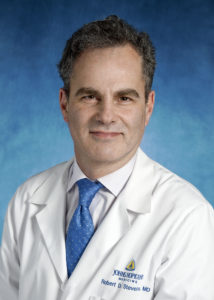 Dr. Stevens is fellowship-trained and board-certified in critical care medicine, neurocritical care, and anesthesiology. He treats patients with critical illnesses such as sepsis, ARDS, acute kidney injury, traumatic brain injury, and stroke. He has special expertise in the resuscitation of patients after cardiac arrest. Following medical studies, Dr. Stevens received postdoctoral research training in molecular neurobiology, cellular electrophysiology, advanced magnetic resonance imaging, and brain mapping. He holds faculty appointments in the Johns Hopkins Institute for Cell Engineering, Institute for Computational Medicine and the FM Kirby Center for Functional Neuroimaging. Dr. Stevens is on the Council of the European Society of Intensive Care Medicine and chairs the Committee on Computational Critical Care Medicine at the SCCM. He is an Associate Editor of the journal Thorax, and serves on the Editorial Boards of Critical Care Medicine, Neurocritical Care, and Frontiers in Neurology.
Dr. Stevens is fellowship-trained and board-certified in critical care medicine, neurocritical care, and anesthesiology. He treats patients with critical illnesses such as sepsis, ARDS, acute kidney injury, traumatic brain injury, and stroke. He has special expertise in the resuscitation of patients after cardiac arrest. Following medical studies, Dr. Stevens received postdoctoral research training in molecular neurobiology, cellular electrophysiology, advanced magnetic resonance imaging, and brain mapping. He holds faculty appointments in the Johns Hopkins Institute for Cell Engineering, Institute for Computational Medicine and the FM Kirby Center for Functional Neuroimaging. Dr. Stevens is on the Council of the European Society of Intensive Care Medicine and chairs the Committee on Computational Critical Care Medicine at the SCCM. He is an Associate Editor of the journal Thorax, and serves on the Editorial Boards of Critical Care Medicine, Neurocritical Care, and Frontiers in Neurology.
Dr Stevens’ vision is to deploy Precision Medicine for the benefit of critically ill patients. His research aims to discover and validate patient-specific biological signatures associated with trauma, surgery and acute conditions such as stroke, cardiac arrest, and sepsis. To achieve this, he engages with an interdisciplinary group of basic and systems neuroscientists, biomedical and computer engineers, biostatisticians, data scientists, and neuroradiologists. Dr Stevens is the principal investigator of the Neuroimaging for Coma Emergence and Recovery (NICER) project, which examines MRI features of the brain connectome to enhance classification and prediction in patients recovering from severe brain injury. Other projects from Dr Stevens’ group analyze features captured through neurophysiologic monitoring, structural and functional MRI of the brain, serum biomarkers and wearable sensors, with the goal of enhancing classification and prediction in vulnerable, acutel ill patients. In the lab, Dr Stevens’ group studies molecular and cellular determinants of injury and recovery in experimental models of traumatic brain injury, stroke, and sepsis, with a special emphasis on neuro-immunological responses and cellular regeneration.